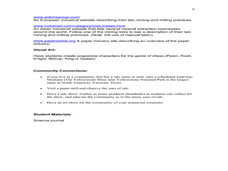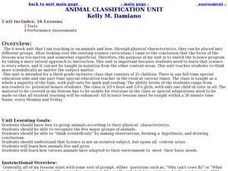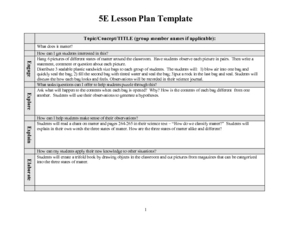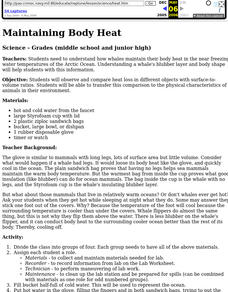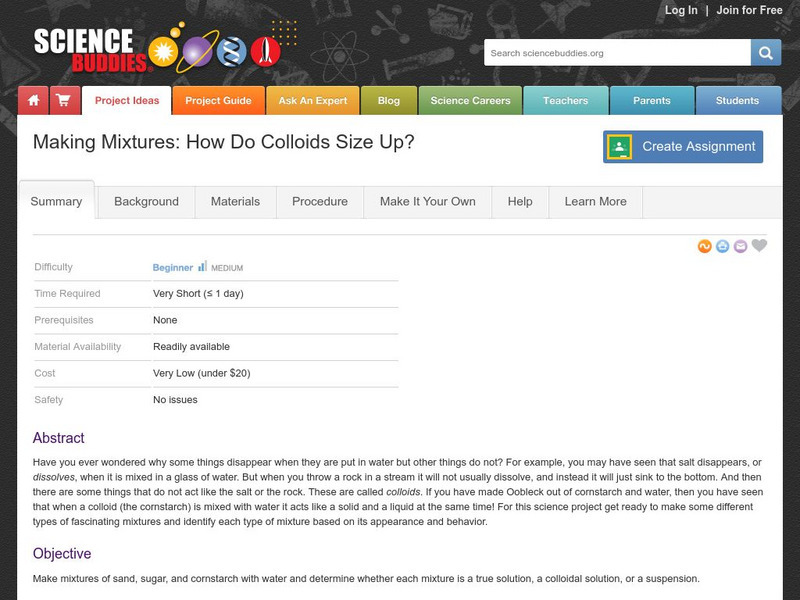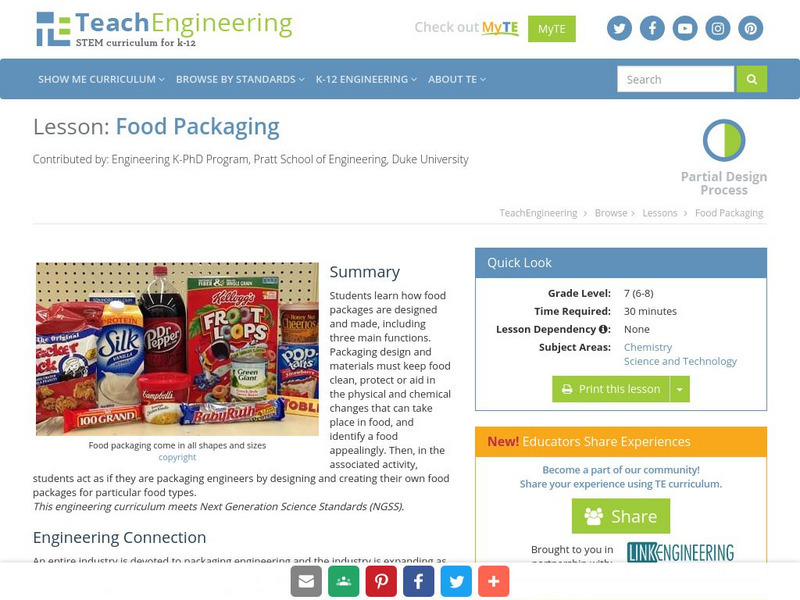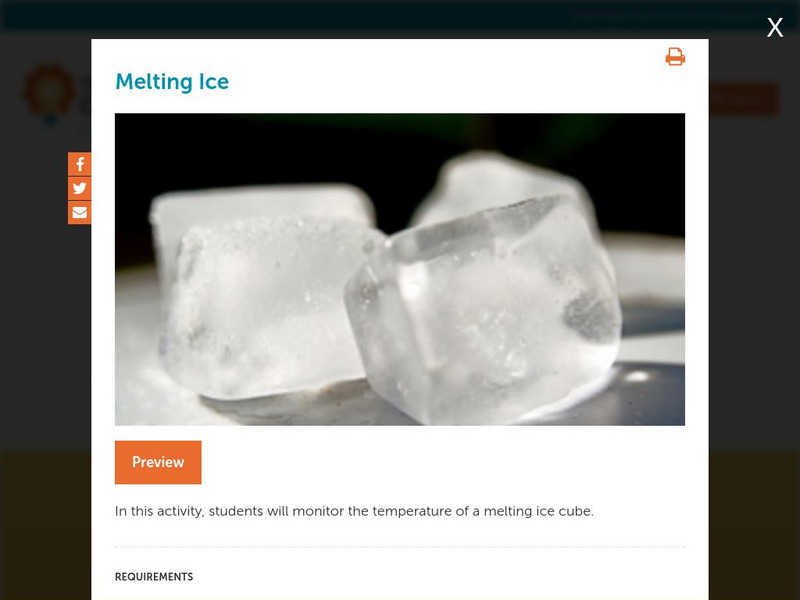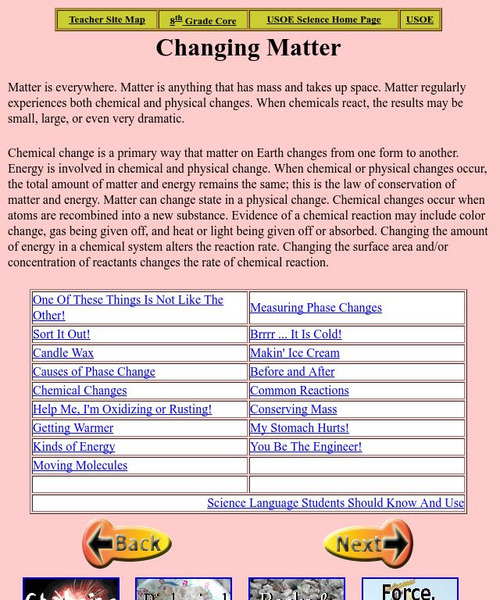Curated OER
Elements and Compounds
Eighth graders explore the chemical and physical properties of a variety of elements in a lab setting. They organize the data they collect onto a spreadsheet and then choose one element from the periodic table to research. They...
Curated OER
Magnifiers
Students describe how several different objects magnify a provided sentence and decide if they are good magnifiers or not. They then write a sentence describing two properties an object must have in order to be a good magnifier.
Curated OER
Project Geode
Students predict the appearance of a geode's internal structure based on its mass and density. They form a hypothesis based on the data they collect. They also identify common minerals found in Illinois.
Curated OER
Our Solar System
Students study the Earth and Solar System through a variety of activities. They compile a coloring book show the characteristics of the Sun and nine planets.
Curated OER
Bubble, Bubble, Soil and Fun!
Fifth graders experiment to find the physical properties and commercial uses of the mineral talc. They create a soapstone sculpture and a rubric for the creation.
Curated OER
Animal Classification Unit
Third graders study how to group animals by their physical characteristics. They examine how animals have adapted to have their needs met by the environment.
Curated OER
What Does It Matter?
Students match definitions with vocabulary words and learn basic facts about matter. Then, they see how to determine the physical characteristics of matter. They determine the mass, volume, and density of objects using appropriate tools...
Curated OER
Mystery Powders
Students describe the physical properties of polymers. In this chemistry instructional activity, students experiment on different polymer powders and identify each one of them. They record their observations and share them to class.
Curated OER
Weathering Experiments: sugar cubes, steel wool and gravel!!
Students study the chemical and physical weathering of "rocks". In this weathering experiments lesson students complete a lab that demonstrates how rocks weather.
Curated OER
The Structure of Matter
In this matter worksheet, students compare and contrast chemical and physical properties and explain the relationship between a pure substance and a mixture. Students review the properties of metals and nonmetals. This worksheet has 1...
Curated OER
Resources - A Reading Guide
In this resources learning exercise, high schoolers compare and contrast physical and chemical properties and changes. Students review the periodic table, pattern of atomic numbers and chemical reactivity. This learning exercise has 56...
Curated OER
How Can Materials Be Identified?
In this identifying materials worksheet, students will complete a graphic organizer by writing in 3 details about how physical properties help to identify different materials.
Curated OER
One for the Money
Eighth graders sort items as they are shown one at a time by the teacher. They attempt to identify the one physical trait the teacher is looking for (metal and not metal). After several objects have been shown and placed in groups, the...
Curated OER
Down To Earth
Fifth graders study the physical properties of minerals in order to identify them. They examine how minerals are used before taking part in a activity in which they market toothpaste made from specific minerals.
Curated OER
Comparing Apples and Oranges
Fifth graders, in groups, examine different types of apples and how they are different. They also taste the differences of each apple. They use this lesson plan to explore how to make observations.
Curated OER
Density of Glass Fragments
Students explore how the density of an object is determined and determine what a "physical property" is. They demonstrate how science can be applied to police work.
Curated OER
Maintaining Body Heat
Students observe and compare heat loss in different objects with surface-to-volume ratios. They transfer this comparison to the physical characteristics of animals in their environment. They focus on how whales maintain their body heat.
Science Buddies
Science Buddies: Getting Critical Over Colloids
What is a colloid? If you have made Oobleck out of corn starch and water, then you know that a colloid is a mixture that acts like a solid and a liquid at the same time. This activity helps you determine the critical factors that...
Science Education Resource Center at Carleton College
Serc: Lab Investigation Mixture Separation
An inquiry lab where students try to separate as much as the pure substance they can in a set time period. This lab helps students understand that physical means can be used to take apart a mixture.
TeachEngineering
Teach Engineering: How Cold Can You Go?
Students explore materials engineering by modifying the material properties of water. Specifically, they use salt to lower the freezing point of water and test it by making ice cream. Using either a simple thermometer or a mechatronic...
TeachEngineering
Teach Engineering: Food Packaging
This instructional activity focuses on how food packages are designed and made. Students will learn three of the main functions of a food package. They will learn what is necessary of the design and materials of a package to keep food...
Concord Consortium
Concord Consortium: Stem Resources: Melting Ice
Using temperature probes, students will monitor the temperature of melting ice cubes in different situations. This lab activity, allows students to view the procedure and answer questions online that can be saved and evaluated by the...
Utah State Office of Education
Utah Science: Changing Matter
Matter changes both physically and chemically on a fairly regular basis. Through these activities students will challenge their understanding of the changes that may take place with different types of matter.






